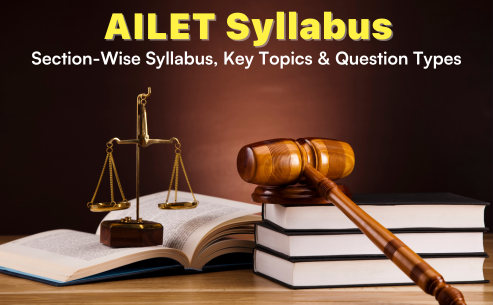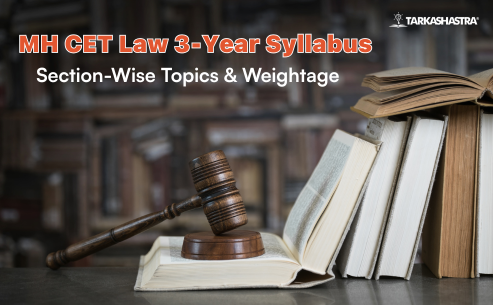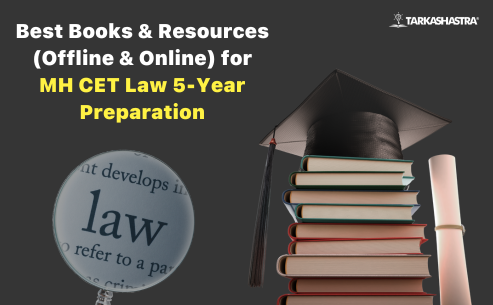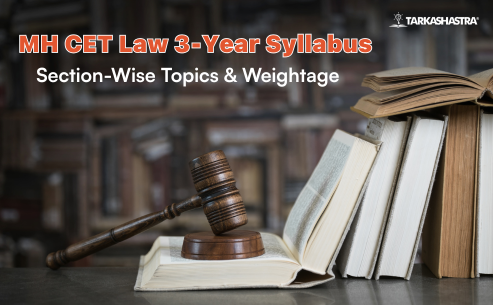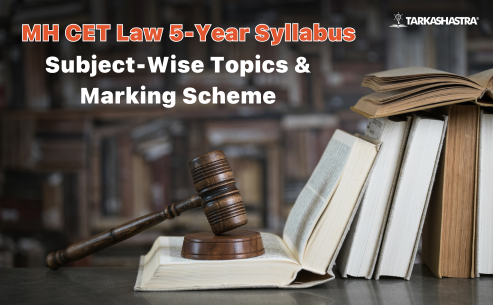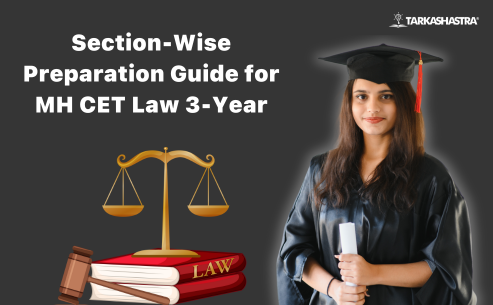The All India Law Entrance Test (AILET) 2026 is one of the most prestigious national-level entrance exams conducted by National Law University, Delhi (NLU Delhi) for admission into its BA LLB (Hons.), LLM, and PhD programs. With thousands of aspirants competing for limited seats, a clear understanding of the AILET syllabus 2026 becomes the first step towards success.
Over the past few years, the exam has undergone key changes — most notably, the removal of the Mathematics section post-2022. The focus has now shifted strongly towards English Language, Current Affairs & General Knowledge, and Logical Reasoning. Among these, Logical Reasoning holds the highest weightage, making it a decisive factor in a candidate’s performance.
The syllabus of AILET 2026 not only tests subject knowledge but also a student’s ability to analyze, comprehend, and apply concepts to real-life and legal scenarios. Unlike rote-based exams, AILET focuses on critical reasoning, legal awareness, and analytical depth.
In this blog, we will provide a detailed, section-wise breakdown of the AILET syllabus 2026, covering key topics, question types, section-wise weightage, difficulty levels, and preparation tips. Whether you’re aiming for BA LLB or LLM, this guide will help you streamline your preparation with a focused strategy.
AILET 2026 Exam Overview
The AILET exam is conducted annually by National Law University (NLU), Delhi, for admission into its BA LLB (Hons.), LLM, and PhD programs. It is considered one of the most competitive law entrance exams in India, with thousands of aspirants vying for limited seats.
Below is a quick overview of the AILET 2026 exam pattern and structure:
| Particulars | Details (Expected for 2026) |
| Exam Name | AILET (All India Law Entrance Test) |
| Conducting Body | National Law University (NLU), Delhi |
| Courses Offered | BA LLB (Hons.), LLM, PhD |
| Exam Mode | Offline (Pen-and-Paper Based) |
| Exam Duration | 120 minutes (2 hours) |
| Total Marks | 150 |
| Sections | English Language, Current Affairs & General Knowledge, Logical Reasoning |
| Marking Scheme | +1 mark for correct answer, -0.25 for wrong answer |
| Language of Exam | English |
This structure makes it clear that AILET 2026 is designed to evaluate reading comprehension, reasoning ability, and awareness of current affairs, with no Mathematics component included.
AILET 2026 Important Dates
The AILET 2026 exam cycle will run in a phased manner, beginning with the official notification in June 2025 and concluding with the declaration of results in December 2025. Aspirants must stay updated with all deadlines to avoid missing any key step in the application or exam process.
Revised AILET 2026 Schedule
| Event | Dates (Revised) |
| Release of AILET 2026 notification | June 17, 2025 |
| Release of revised AILET 2026 notification | July 22, 2025 |
| Start of online AILET application form | August 7, 2025 |
| Last date to submit AILET 2026 application form | November 10, 2025 |
| Release of AILET admit card | Third week of November 2025 |
| AILET 2026 Exam Date | December 14, 2025 (Revised) |
| Timing of AILET 2026 exam | 2:00 PM – 4:00 PM |
| Release of final answer key | Second week of December 2025 |
| Declaration of AILET results | Third week of December 2025 |
Key Insight
With the exam scheduled on December 14, 2025, candidates will have roughly four months of concentrated preparation time after the application window closes. This period should be utilized wisely with strategic revision and mock tests to maximize performance.
AILET Syllabus 2026 – Section-Wise Breakdown
1. English Language
The English Language section of AILET 2026 is designed to test a candidate’s reading comprehension skills, vocabulary, and command of grammar. Unlike pure memorization, this section focuses on how well you can interpret passages, identify meanings, and apply language rules in context.
Key Areas to Focus On:
| Topic | What to Expect | Importance |
| Reading Comprehension | Passages with inference-based, fact-based, and tone-based questions | High |
| Vocabulary | Synonyms, antonyms, idioms, phrases, one-word substitutions | Moderate |
| Grammar & Usage | Sentence correction, error spotting, fill in the blanks | Moderate |
| Para jumbles | Rearranging jumbled sentences into a coherent paragraph | Low to Moderate |
| Figures of Speech & Analogies | Identifying usage in context | Low |
Question Types in AILET English:
- RC passages with multiple-choice questions.
- Sentence correction and fill in the blanks.
- Vocabulary-based direct questions (synonyms/antonyms).
- Para jumbles and sentence arrangement.
Preparation Tip:
Focus on editorials and opinion pieces from reputed newspapers like The Hindu or Indian Express to sharpen comprehension and vocabulary. Regular practice of mock passages and grammar drills ensures accuracy and speed.
2. Current Affairs & General Knowledge
The GK & Current Affairs section of AILET 2026 evaluates a candidate’s awareness of recent events, static general knowledge, and legal updates. This section requires both consistent daily reading and revision of static subjects.
Key Areas to Focus On:
| Topic | What to Expect | Importance |
| Current Affairs (Last 12–15 Months) | National & International events, awards, sports, government policies, economic updates | Very High |
| Legal GK | Recent judgments, constitutional amendments, new bills and laws, landmark cases | High |
| Static GK | History, Geography, Indian Polity, Economy, Environment | Moderate |
| International Affairs | Treaties, global organizations, summits, international disputes | Moderate |
| Miscellaneous | Books & Authors, Science & Technology, Appointments, Ranks & Reports | Low to Moderate |
Question Types in AILET GK & CA:
- MCQs based on recent events and factual knowledge.
- Legal awareness questions linking current affairs with the law.
- Questions on static subjects like polity and history with direct factual answers.
Preparation Tip:
Read newspapers like The Hindu or Indian Express daily, along with monthly current affairs compilations. For legal GK, follow Supreme Court & High Court judgments summaries and government notifications. Revision is key — allocate at least 15–20 minutes daily for GK updates.
3. Logical Reasoning
The Logical Reasoning section is the most critical part of AILET 2026, carrying the highest weightage (70 marks out of 150). It tests a candidate’s ability to analyze patterns, solve puzzles, and evaluate arguments. This section is broadly divided into Analytical Reasoning and Critical Reasoning.
A. Analytical Reasoning
This part focuses on problem-solving through structured logic.
| Topic | What to Expect | Difficulty Level |
| Puzzles & Arrangements | Seating arrangements (linear, circular), scheduling, grouping | Moderate–High |
| Series & Coding-Decoding | Number/letter series, symbol-based coding | Easy–Moderate |
| Blood Relations | Family tree problems, coded relations | Easy |
| Direction Sense | Distance, movement, and orientation-based problems | Easy |
| Ranking & Ordering | Questions on position, order, and hierarchy | Moderate |
| Syllogisms & Venn Diagrams | Statement-based logical deductions | Moderate |
B. Critical Reasoning
This part evaluates a candidate’s ability to think logically, analyze arguments, and draw valid conclusions.
| Topic | What to Expect | Difficulty Level |
| Assumptions & Conclusions | Identifying hidden assumptions and logical outcomes | Moderate–High |
| Strengthen/Weaken Arguments | Determining which statements support or weaken an argument | High |
| Cause & Effect | Questions on correlation and logical implications | Moderate |
| Statement & Inference | Drawing valid inferences from given statements | High |
| Assertion & Reason | Analyzing logical consistency between statements | Moderate |
| Critical Reading | Application-based RC passages with logical analysis | Moderate–High |
Question Types in AILET Logical Reasoning:
- Multi-step reasoning puzzles.
- Cause-and-effect, inference, and assumption-based MCQs.
- Critical reasoning questions require analysis of legal or real-world scenarios.
Preparation Tip:
Since Logical Reasoning carries nearly 45% of the total weightage, allocate maximum preparation time here. Practice previous year AILET papers, reasoning workbooks, and timed mock tests. Focus primarily on Critical Reasoning, as it is relatively new and often more challenging for aspirants.
Section-Wise Weightage of AILET 2026
A strong preparation plan for AILET begins with knowing how many questions each section carries and what percentage of the paper it represents. Since all three sections—English Language, Current Affairs & General Knowledge, and Logical Reasoning—are compulsory, candidates must balance their time and focus according to their weightage in the exam.
The AILET 2026 paper has 150 questions in total, each carrying 1 mark. Every wrong answer results in a negative marking of 0.25 marks, so accuracy is just as important as speed. Out of these three sections, Logical Reasoning commands the highest share with nearly 47% of the paper, making it the most decisive part of the test. English Language follows with around 33%, while Current Affairs & GK contributes about 20%.
Here’s the detailed section-wise distribution of AILET 2026:
| Section | Expected No. of Questions | Marks | Weightage (%) |
| English Language | 50 | 50 | ~33% |
| Current Affairs & General Knowledge | 30 | 30 | ~20% |
| Logical Reasoning | 70 | 70 | ~47% |
| Total | 150 | 150 | 100% |
Key Takeaways from the Weightage
- Logical Reasoning is the game-changer: With 70 questions, it decides overall performance. Students must dedicate at least half of their preparation time here.
- English Language is equally vital: Contributing 1/3rd of the marks, this section requires strong vocabulary, grammar, and comprehension skills.
- GK & Current Affairs can be a quick rank-booster: Even though it carries only 20%, it requires the least time during the exam. Regular newspaper reading and monthly revision can help you maximize your score quickly.
- Balanced strategy is key: Over-focusing on one section while neglecting others can reduce overall marks. Intelligent time management across all three sections ensures stability in performance.
In short, Logical Reasoning will largely determine your rank. Still, mastery over English and GK can make the difference between just clearing the cut-off and securing admission to NLU Delhi.
AILET 2026 – Recommended Preparation Approach
Understanding the syllabus is only half the journey; the other half is preparing with the right strategy. Since AILET tests comprehension, awareness, and reasoning more than rote knowledge, aspirants must align their preparation with the weightage and nature of questions.
1. English Language Preparation
- Read editorials, opinion articles, and legal columns daily to improve comprehension.
- Maintain a personal word bank of new vocabulary and revise regularly.
- Practice grammar-based MCQs and para jumbles from past AILET papers.
- Focus on speed reading techniques to handle multiple RC passages efficiently.
2. Current Affairs & GK Preparation
- Dedicate 15–20 minutes daily to reading newspapers like The Hindu or Indian Express.
- Use monthly GK compendiums for revision of current events.
- For legal GK, focus on recent Supreme Court judgments, amendments, and government bills.
- Revise static GK topics weekly (History, Polity, Geography) with short notes.
3. Logical Reasoning Preparation
- Allocate 50% of preparation time to reasoning since it has maximum weightage.
- For Analytical Reasoning, practice puzzles, arrangements, and series with timed drills.
- For Critical Reasoning, solve assumption-conclusion and strengthen-weaken arguments daily.
- Analyze previous year AILET reasoning questions to identify recurring patterns.
- Attempt full-length mocks to improve both accuracy and exam temperament.
4. Time Management Strategy
- English (50 Qs): Aim to finish in 30–35 minutes.
- GK & Current Affairs (30 Qs): Complete in 10–15 minutes.
- Logical Reasoning (70 Qs): Dedicate 60–65 minutes with focus on accuracy.
- Keep 5–10 minutes for review and corrections.
AILET 2026 – Question Types & Expected Difficulty
The AILET 2026 exam tests candidates on a mix of direct factual questions and application-based reasoning problems. While English and GK are generally straightforward, Logical Reasoning is the most challenging section due to its analytical and critical nature.
Here’s a section-wise look at the type of questions and their expected difficulty level:
| Section | Question Nature | Expected Difficulty |
| English Language | Reading comprehension passages, grammar-based MCQs, vocabulary usage, para jumbles | Moderate |
| Current Affairs & GK | Factual questions (events, awards, appointments) + legal GK on amendments/judgments | Moderate |
| Logical Reasoning | Analytical puzzles, series, blood relations + critical reasoning (assumptions, strengthen/weaken, inference) | Moderate to Difficult |
Analysis & Insights
- English Language: The difficulty is moderate. Passages are not very lengthy but require careful reading. Vocabulary and grammar can be scored if prepared consistently.
- Current Affairs & GK: This section is fact-heavy. Questions are usually straightforward but require consistent preparation over months, not last-minute cramming.
- Logical Reasoning: The toughest section of AILET. Analytical reasoning demands accuracy under time pressure, while critical reasoning tests a candidate’s ability to evaluate arguments—a skill central to legal studies.
Overall, aspirants should expect the paper to be balanced yet reasoning-intensive, where success depends more on logical aptitude and awareness than rote memorization.
Best Resources for AILET 2026 Syllabus Preparation
Choosing the right study material can make all the difference in cracking AILET 2026. Instead of juggling multiple sources and outdated books, aspirants should rely on a single, streamlined set of resources designed specifically for the exam.
At Tarkashastra, we provide curated AILET preparation material that covers the entire syllabus in a focused and exam-oriented manner.
Tarkashastra’s AILET Resources Include:
- Tarkashastra AILET e-Books & Hard Copy Books – Section-wise coverage of English, GK & Current Affairs, and Logical Reasoning. Designed to reflect the latest AILET syllabus and question types.
- Previous Year AILET Question Papers with Detailed Solutions – To help aspirants understand exam trends and practice authentic questions.
- Full-Length AILET Mock Tests – Replicating the exact exam pattern with AI-driven analytics for performance tracking.
- Sectional Tests & Topic-Wise Practice Sets – For targeted improvement in weak areas.
- Mentor-Led Sessions & Strategy Classes – Delivered by expert mentors to clarify concepts and guide students with proven strategies.
By preparing with Tarkashastra’s resources, students ensure that they are studying only what matters for AILET 2026, saving time and boosting their chances of securing admission to NLU Delhi.
Conclusion
The AILET Syllabus 2026 demands a balance of strong reasoning skills, awareness of current affairs, and solid command over English. With nearly half the paper dedicated to Logical Reasoning, this section becomes the game-changer, while English and GK act as scoring boosters when prepared smartly. For PG aspirants, in-depth knowledge of law subjects, Bare Acts is equally essential.
At Tarkashastra, we simplify this journey with expert-curated study material, full-length mocks, sectional tests, and personalized mentorship — all designed in line with the latest AILET syllabus. With the right strategy and resources, securing your place at NLU Delhi becomes an achievable goal.
Start your AILET 2026 preparation today with Tarkashastra’s proven guidance and take the first step towards your dream law career.
Frequently Asked Questions (FAQs) on AILET Syllabus 2026
1. What are the sections in the AILET 2026 syllabus for BA LLB?
The AILET 2026 syllabus for BA LLB includes three sections: English Language, Current Affairs & General Knowledge, and Logical Reasoning. Mathematics is no longer part of the exam after 2022. Each section carries a different weightage, with Logical Reasoning being the most important.
2. How many questions are asked in AILET 2026?
The BA LLB exam will have 150 questions in total. These are divided into 50 from English, 30 from Current Affairs & GK, and 70 from Logical Reasoning. Each question carries one mark, with negative marking for wrong answers.
3. Which section carries the maximum weightage in AILET 2026?
Logical Reasoning carries the highest weightage with 70 questions worth 70 marks. This makes up nearly 47% of the total exam. Strong preparation in this section can significantly boost a candidate’s overall score.
4. What kind of questions are asked in the AILET English Language?
The English section includes Reading Comprehension passages, grammar-based MCQs, vocabulary questions, and para jumbles. Passages often test inference and contextual understanding. This section is moderately complex but highly scoring.
5. How should I prepare Current Affairs for AILET 2026?
Students should cover events from the past 12–15 months, including awards, government policies, and international developments. Legal current affairs, like judgments and amendments, are crucial. Consistent newspaper reading and monthly compendiums are essential.
6. Does AILET GK include static questions?
Yes, AILET GK includes static questions from subjects like History, Polity, Geography, and Economy. Alongside, dynamic current affairs play a significant role in the paper. A mix of static and dynamic preparation ensures good coverage.
7. What are the main topics in AILET Logical Reasoning?
Logical Reasoning includes Analytical reasoning like puzzles, series, blood relations, and syllogisms. It also tests Critical reasoning through assumptions, inferences, cause-and-effect, and strengthen/weaken arguments. Critical reasoning is often tougher and requires more focus.
8. What is the syllabus for AILET PG 2026 (LLM)?
The PG syllabus covers advanced law subjects including Jurisprudence, Constitutional Law, Criminal Law, Contracts, Tort, Family Law, IPR, Property Law, International Law, and Human Rights.
9. Which topics are most important for AILET PG 2026?
Subjects like Jurisprudence, Constitutional Law, Criminal Law, Contracts, and Human Rights are essential. Landmark judgments and Bare Act provisions should also be thoroughly revised.
10. Are Bare Acts necessary for AILET PG preparation?
Yes, Bare Acts are a must for PG preparation. They help in understanding the exact language of laws and principles. Questions in MCQs often directly refer to Bare Act provisions.
11. How is tie-breaking done in AILET PG 2026?
In case of equal marks, senior age is considered first. If required further, a computerized draw of lots is used. Therefore, maximizing marks is critical to avoid reliance on tie-break rules.
12. What resources should I use for AILET 2026 preparation?
The best resources are Tarkashastra’s AILET e-Books, hard copy books, sectional tests, and mock series. These are curated by mentors to reflect the exact syllabus and question type, avoiding irrelevant material.

